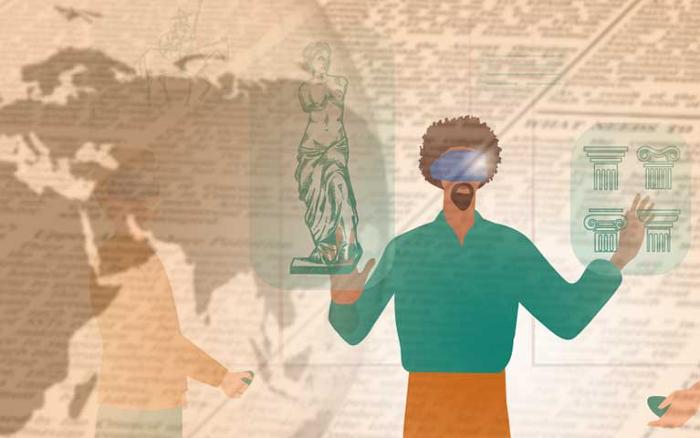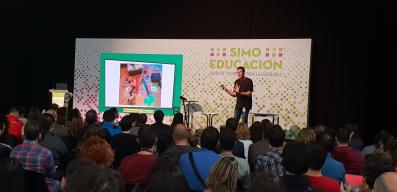

Leading experts in educational innovation join the programme of seminars at SIMO EDUCACIÓN 2019
Organised by IFEMA, the trade fair will take place from 5 to 7 November in Hall 6 at Feria de Madrid
Italian philosopher and professor Nuccio Ordine, neuroscientist Anna Carballo and psychologist Rafael Guerrero are some of the experts who have confirmed their attendance at the SIMO EDUCACIÓN auditórium. | The International Exhibition of Technology and Educational Innovation will this year offer a dozen seminars from experts discussing topics such as artificial intelligence, the educational use of video games, multimodal genres in learning, the family as an educational tool and body percussion for developing cognitive functions.
One of the big draws of the next SIMO EDUCACIÓN, which is organised by IFEMA in partnership with Education 3.0 and taking place from 5 to 7 November at Feria de Madrid, will be the expert seminars that will be held in the auditorium in Hall 6.
One of the highlights will be Italian philosopher and professor Nuccio Ordine delivering a talk entitled ‘Do we study to learn a profession or to become better people? School, university and uselessness’. In this seminar, Ordine suggests that ‘we are losing sight of the essential value of education: training free, educated citizens, capable of applying their knowledge in the service of humanity and democracy. Education and culture as a form of resistance to the corruption of money and consumerism’.
Other experts attending SIMO EDUCACIÓN include Manuel Fernández Navas, professor of didactic method and co-director of the Chair in eSports at the University of Malaga; Jordi Nomen Recio, Head of the Humanities Department at the Sadako School in Barcelona; Carles Serra, director of the CSIC Institut d'Investigació en Intel·ligència Artificial; Dino Miele, expert in educational technology and innovation, and director of the District School Board of Niagara in Canada; Anna Carballo Márquez, psychologist and doctor of neuroscience from the Autonomous University of Barcelona, professor at the International University of Catalonia and the Open University of Catalonia; Javier Romero, professor at the University of Alicante and creator of the BAPNE method; Rafael Guerrero, psychologist and professor at the Faculty of Education at the Complutense University of Madrid and director of Darwin Psicólogos; Daniel Cassany, researcher in discourse analysis at the Pompeu Fabra University in Barcelona; and Francisco Cid Fornell, pre-primary teacher and coordinator of educational innovation at the Quintanilla de San Fernando school in Cadiz.
‘Esports, video games and education: between social panic and educational potential’ - Manuel Fernández Navas
The professor of didactic method and co-director of the Chair in eSports at the University of Malaga will discuss the opportunities offered by video games in the educational arena, the benefits they can bring to learning and the new horizons they open up for high quality activities with students.
‘Childhood: an opportunity for thought and creation’ - Jordi Nomen Recio
In this seminar, the Head of the Humanities Department at the Sadako School in Barcelona will explain how childhood is an opportunity for growth and development, which is rooted in the curiosity and sense of wonder that human beings possess from birth. Nomen will also talk about the development of critical, creative and ethical thinking in boys and girls, to lay the foundations for designing and building a better world.
‘What artificial intelligence can do for education’ - Carles Serra
The director of the CSIC Institut d'Investigació en Intel·ligència Artificial will demonstrate the opportunities that artificial intelligence can offer to the educational community. In specific terms, he will focus on AI techniques that can help in students’ learning, based on methodologies such as collaborative learning, peer review and the development and creation of tasks by the students themselves.
‘Creating an EdTech innovation ecosystem in school’ - Dino Miele
The expert in educational technology and innovation and director of the District School Board of Niagara in Canada will discuss the implementation of an innovative EdTech ecosystem through STEAM subject learning (Science, Technology, Engineering, Arts and Mathematics), promoting wellbeing and prosperity in the form of business accomplishments and strategic and operational leadership.
‘Neuroscience and education: possibilities and limitations’ - Anna Carballo Márquez
The psychologist and doctor of neuroscience from the Autonomous University of Barcelona and professor at the International University of Catalonia and the Open University of Catalonia will talk about educational neuroscience, which stems from the growing interest among teaching professionals in finding a theoretical reference framework that enables pedagogical practice to be based on scientific evidence.
‘Motor coordination and movement in the classroom: the secret is in Africa!’ - Javier Romero
The professor at the University of Alicante and creator of the BAPNE method (biomechanics, anatomy, psychology, neuroscience and ethnomusicology) asks how can we work executive functions through movement? The aim of this seminar is to provide teachers with practical resources using body percussion to enable work on control of impulses, working memory, various types of attention, cognitive flexibility and processing speed. Children cannot sit still for six straight hours, so we can help them stimulate their brains through motor coordination and dual tasking.
‘The 7 steps toward making your student/child an emotional expert’ - Rafael Guerrero
In this talk, the psychologist and professor from the Faculty of Education from the Complutense University of Madrid and director of Darwin Psicólogos will explain what an emotion is and examine the basic emotions, as well as the stages through which both adults and children must go to become emotional experts. The talk will also explore the areas of the brain that are related to our students’/children’s emotions and behaviours.
‘Emerging multimodal genres and new ways of learning’ - Daniel Cassany
The researcher in discourse analysis at the Pompeu Fabra University in Barcelona will present some of the new multimodal genres (fansub, fandub, videos, danmu/danmaku - real-time comments superimposed on videos) used today by young people - in many cases fans who are passionate about specific audiovisual content - to learn on their own. He will also reflect on what formal schooling can do with these multimodal, multilingual and intercultural practices.
‘School, university and uselessness’ - Nuccio Ordine
Do we study to learn a profession or to become better people? This will be the topic for the seminar given by the philosopher and professor of Italian Literature at the University of Calabria in Italy. School and university, already transformed into businesses, seem to be increasingly directed toward the market. This leads the students/clients to believe that if they study it is first and foremost to learn a trade. We lose sight of the essential value of education: training free and educated citizens, enabling them to put their knowledge at the service of humanity and democracy. Education and culture as a form of resistance to the corruption of money and consumerism.
‘The family as a tool for educational innovation’ - Francisco Cid Fornell
The seminar by this pre-primary teacher and coordinator of educational innovation at the Quintanilla de San Fernando school in Cádiz will address the importance of family in the educational process. This will be a historic journey exploring the most important partnerships between family and school from prehistory, through Classical Greece and Rome, to the present day, where he will discuss his ‘questions of interest’ methodology, which has received multiple awards and recognition, and which is currently being implemented in schools across Spain and as far away as Mexico.





